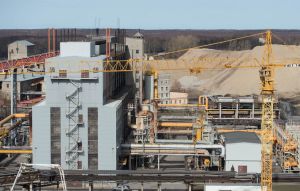Energy, Estonia, Legislation, Oil
International Internet Magazine. Baltic States news & analytics
Monday, 22.12.2025, 06:48
VKG wants resource, pollution fees scrapped amid low oil prices
 Print version
Print version |
|---|
"At the moment producers of shale oil must pay labor taxes, excise duties, environmental charges made up of a resource fee and a pollution fee, as well as other taxes. Environmental charges which do not take into account developments on the international market and the specifics of the oil shale sector make up more than half of our tax burden today," VKG board members Ahti Asmann and Meelis Eldermann said in a letter to ministers.
The managers of VKG say the present system of environmental charges is lacking in flexibility.
"The system of environmental charges should not lead to a situation where using domestic resource is not viable, could lead to the closure of traditional branches of industry and large-scale job losses or significant reduction in competitiveness," it stands in the letter.
The managers are proposing to apply a multiplier to resource and pollution fees that would be 1 when a barrel of Brent crude costs from 80 to 90 dollars.
"A Brent price level of 80 dollars a barrel or more enables the oil shale sector to make vital investments with the present tax burden to ensure the company's long-term viability," the managers of VKG said. They said VKG will not be earning a profit on that price level of crude because of the significant capital costs arising from the investments made in recent years.
A Brent price level of 55-75 dollars means that companies of the oil sector are able to adapt to the market situation in the short term by laying off workers, cutting investments and using money meant for future investments as a buffer. In the long term a price level like that will lead to a reduction in jobs and demise of the sector. The multiplier values to be applied in a situation like that would be 0.3–0.65.
With a Brent price of 55 dollars or less per barrel the multiplier would be zero, whereas with a price level of 40 dollars or less the multiplier would be negative. When the price of crude oil drops below 40 dollars it will make sense for the government to support the oil shale sector to an extent equaling the amount of money paid in labor taxes in order to ensure the preservation of jobs and a stable socio-economic situation in East-Viru county, the authors of the letter say.
"The precise mechanism of the application of the negative multiplier has yet to be worked out. With a price of 20 dollars a barrel or less labor taxes will equal [negative] resource and pollution fees and in a situation like that the state will get no tax income, but jobs will be preserved and the state will need no additional money for social expenditures," the letter says. The value of the multiplier then would be –0.4.
The letter adds that until the system of multipliers is introduced, the oil shale resource fee, the fee for depositing onto land and the fee for sulphur dioxide emissions should be retroactively cut to zero from Jan. 1 this year.
A barrel of Brent crude cost 30.4 dollars on Tuesday afternoon. In the past two weeks the price has been in the range of 28–32 dollars a barrel.
Citing a continuous significant decline in global oil prices, VKG announced in the middle of this month it will conserve its oil plants using the Kiviter technology and make approximately 500 employees redundant.








 «The Baltic Course» Is Sold and Stays in Business!
«The Baltic Course» Is Sold and Stays in Business!

